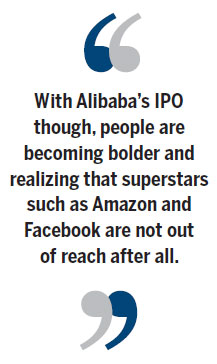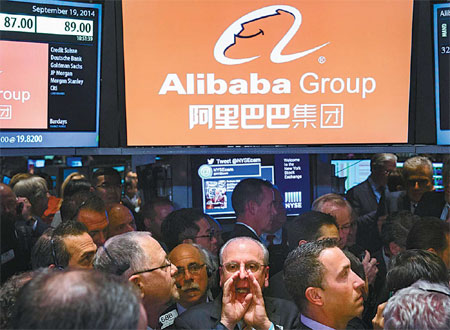Ma points way for would-be trailblazers
Updated: 2014-09-26 09:04
By He Feng(China Daily Europe)
|
|||||||||||
|
Traders wait for a final price on the Alibaba Group Holding Ltd IPO at the New York Stock Exchange on Sept 19. Lucas Jackson / Reuters |

Alibaba IPO is significant in underlining the ambitions of Chinese entrepreneurs
Legend has it that when Jack Ma first went to the US to raise money for his then-young startup, he was turned down by every one of the investors he met. More than a decade later, Ma was back, this time asking for a bit more money. About $25 billion more to be exact. Alibaba has now become the largest IPO in history after beginning to trade on the New York Stock Exchange with a strong opening of more than 35 percent above the IPO price.
Unlike in the US, where technology companies tend to stay in their niche (Google, for example, still makes most of its profit from searches, despite its size), China's Internet space is dominated by three giant companies whose business observes no such limitations. The three, Alibaba, Baidu and Tencent, control pretty much all of China's online life, from search to shopping to communication.
Alibaba is the last of the three to launch an IPO, but arguably has the most vibrant collection of business interests and attracted the most media attention thanks to its colorful and often controversial founder.
Because of its overwhelming market position in a number of sectors, the occasional naysayer notwithstanding, Alibaba's strong IPO performance was largely expected.
So a rewarding and no doubt emotional moment for the Alibaba team, and its investors, but apparently no more and no less than what was expected. It has been a few days since the launch on Sept 19, and both the international and Chinese media are moving onto the next shiny thing. But I hope Alibaba's IPO will go a long way in putting Chinese companies on the map of globally recognized technology brands, something that arguably its predecessors, including Baidu and Tencent, have failed to do.
Looking from the outside in, Chinese companies seem to be operating in a different world. They dominate their home market, but few venture outside it, and those who have tried have met with little success. As a result, Chinese tech companies remain marginalized, even irrelevant, in a global context. Just a few months ago, I was somewhat alarmed that, while everyone in Silicon Valley was talking about Snapchat, a fast-growing mobile communication app, few had heard of WeChat, Tencent's popular chat app that boasts hundreds of millions of users in China.
This is unfortunate in an industry that is proud of its potential to break through geographical boundaries. The slew of Chinese companies that have launched IPOs in the US, from Sina to Baidu, has done little to put Chinese tech companies in the mainstream. For all practical purposes, these companies are focused on the Chinese market and derive almost all of their revenue from it.
Alibaba stands a chance to change that. First there is its sheer size. Not only does it dominate the online retail space in China, it is also a top contender in a number of other sectors, including online payments and cloud services.
Each sector could comfortably support one or two public companies. Collectively, they have created a company that overtook Amazon and Facebook on its public debut.
Fresh from a successful IPO and with its money minting business interests, Alibaba is no doubt on the lookout for acquisitions, which have already benefited some hot startups in Silicon Valley.
For venture capitalists and entrepreneurs it would mean a new exit option; for the established Silicon Valley companies it is another buyer to compete for a hot deal. Either way, Alibaba is sure to make its financial weight felt.
But perhaps more important than its size and money, Alibaba has been able to touch more Americans (or Europeans or Africans) in a way that other Chinese tech companies had not. Its business portfolio may make it sound as though it is a Jack of all trades now, but its very first breakout was a yellow pages service for small Chinese companies trying to export. It served as a bridge between Chinese manufacturers and buyers from around the world.
National Public Radio in the US did a story just before Alibaba's IPO about how some Californian geeks bought parts from Alibaba to build a home-made yet technically sophisticated chicken fence. An NPR story may not quite qualify as mainstream media attention, but the story carried a homey relevance that is unseen in other reporting of Chinese companies, which could only hold interest from investment managers and high-tech executives.
The NPR story portrayed Alibaba as a company that is relevant to ordinary people - and chickens - living outside China.
It is perhaps an exaggeration to say that Alibaba's IPO symbolizes the coming of age for Chinese tech companies, but it does mark a significant moment that highlights the ambition of Chinese entrepreneurs and points the way to how high they can fly.
Tech executives outside China underestimate the ambitions of companies like Alibaba and Baidu. More damagingly, some Chinese entrepreneurs shortchange themselves, being content to create a business just for the Chinese market.
With Alibaba's IPO though, people are becoming bolder and realizing that superstars such as Amazon and Facebook are not out of reach after all. That Chinese innovation no longer means cheap knockoffs (for both luxury bags and copycat web services), but can also create companies that comfortably hold their own among the best that Silicon Valley has to offer.
Ma has always been very vocal about supporting entrepreneurship among young people. His Taobao has helped more people launch their businesses than any venture capitalist. Perhaps with his latest success, more Chinese entrepreneurs will follow his example and create companies that work towards creating a more connected global business ecosystem.
The author is an independent commentator based in Beijing. He can be reached at fengwriting@gmail.com. The views do not necessarily reflect those of China Daily.
(China Daily European Weekly 09/26/2014 page9)
Today's Top News
UK to join airstrikes against IS in Iraq
Qatar forfeit basketball game
Russia turns to RMB to thwart Western sanctions
Express delivery sector opens up
China rebuffs EU on condemning life sentence
Emissions report tells only part of story, expert says
India triumphs in Mars mission
iPhone smugglers targeted
Hot Topics
Lunar probe , China growth forecasts, Emission rules get tougher, China seen through 'colored lens', International board,
Editor's Picks

|

|

|

|

|

|






